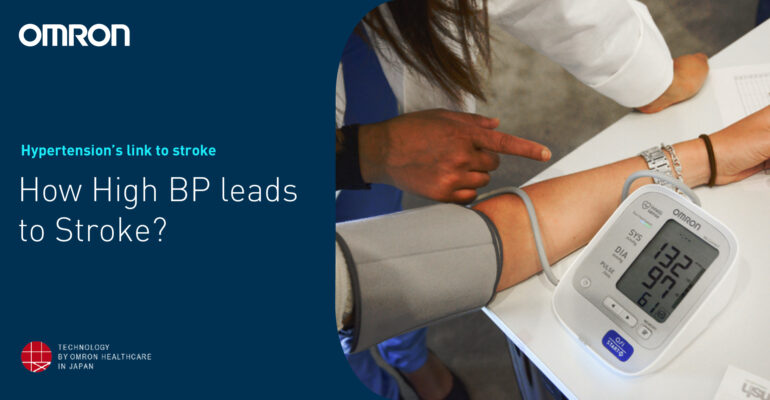How high blood pressure leads to stroke?
March 20, 2023 2023-04-11 16:15How high blood pressure leads to stroke?

How high blood pressure leads to stroke?
High blood pressure, also known as hypertension, is a common medical condition that affects many individuals. According to the World Health Organization, an estimated 1.28 billion adults aged 30-79 years worldwide have hypertension, with two-thirds of them living in low- and middle-income countries.[1] According to WHO, 220 million people in India have hypertension. Only 12% of people with hypertension have their blood pressure under control.[2]
Hypertension occurs when the force of blood against the walls of the arteries is consistently too high with a reading of 140/90 mmHg. It led to serious health problems. One of the most serious consequences of uncontrolled high blood pressure is stroke.
A stroke occurs when the blood supply to the brain is interrupted, either by a blood clot or by a burst blood vessel. When blood pressure is elevated, the heart must work harder to pump blood throughout the body, and this increased stress on the cardiovascular system can lead to the formation of blood clots, damage to blood vessels, and other problems that increase the risk of stroke.[3]
There are over 12.2 million new strokes each year. Globally, one in four people over age 25 will have a stroke in their lifetime. Globally, there are over 101 million people currently living who have experienced stroke. The main cause is high blood pressure. However, stroke also occurs in about 8% of children with sickle cell disease.[4]
There are two main types of strokes
- Ischemic stroke: Which occurs when a blood clot blocks a blood vessel in the brain.
- Hemorrhagic stroke: which occurs when a blood vessel in the brain bursts.
The following are some of the ways in which high blood pressure can increase the risk of stroke:
- Hardening of the arteries: High blood pressure can cause the arteries to become stiff and narrow, reducing blood flow to the brain and increasing the risk of stroke.
- Blood clots: When blood pressure is elevated, the heart has to work harder to pump blood throughout the body. This can increase the risk of clots forming and lead to stroke.
- Weak blood vessels: High blood pressure can cause the walls of the blood vessels to become weaker, making them more susceptible to rupturing and leading to a hemorrhagic stroke.
- Atherosclerosis: Over time, high blood pressure can cause fatty deposits to build up in the arteries, leading to a condition called atherosclerosis. This can narrow the blood vessels and increase the risk of stroke.
Additionally, High blood pressure is a major risk factor for other cardiovascular disease. It can cause the heart to work harder and enlarge, increasing the risk of heart failure. High blood pressure can also damage the blood vessels in the eyes, kidneys, and other organs, leading to serious health problems.
In addition to high blood pressure, other risk factors for stroke include smoking, obesity, high cholesterol, physical inactivity, and a family history of stroke.
There are several steps you can take to reduce your risk of stroke, including:
- Maintaining a healthy blood pressure: If you have high blood pressure, your doctor may prescribe medication to help lower it. You can also make lifestyle changes to help reduce your blood pressure, including losing weight, eating a healthy diet, and getting regular exercise.
- Quitting smoking: Smoking increases your risk of stroke by narrowing your blood vessels and increasing your blood pressure.
- Eating a healthy diet: A diet that is rich in fruits, vegetables, whole grains, and lean protein can help lower your risk of stroke.
- Staying physically active: Regular exercise can help lower your blood pressure and reduce your risk of stroke. Aim for at least 30 minutes of physical activity on most days of the week.
- Managing other health conditions: If you have other health conditions, such as diabetes, high cholesterol, or heart disease, it’s important to manage them to reduce your risk of stroke.
Regular monitoring and control of blood pressure by using bp machine can help prevent stroke and other complications associated with hypertension.
Using an OMRON bp monitor can be a helpful tool in reducing the risk of stroke for individuals with high blood pressure. By regularly monitoring your blood pressure at home, you can keep track of any changes and make adjustments to your lifestyle and medication regimen if necessary. It also helps you to reach out to your doctor for advice in case you come across a variation or detect Atrial Fibrillation (Afib) during your measurement during your home monitoring
Wrap-Up:
Blood pressure and stroke are closely linked, by taking steps to maintain a healthy blood pressure and reducing other risk factors along with regular home monitoring, you can reduce your risk of stroke and improve your overall health.
Reference:
- https://www.who.int/news-room/fact-sheets/detail/hypertension
- https://www.who.int/india/health-topics/hypertension
- https://www.mayoclinic.org/diseases-conditions/high-blood-pressure/in-depth/high-blood-pressure/art-20045868#:~:text=Blood%20vessels%20damaged%20by%20high,and%20potentially%20causing%20a%20stroke.
- https://www.world-stroke.org/world-stroke-day-campaign/why-stroke-matters/learn-about-stroke






